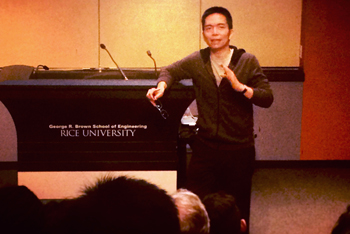Following the history of the tech industry as it intersects with design, award-winning graphic designer, computer scientist, academic and author John Maeda discussed how the business influence of design goes far beyond its visual appeal at the annual Scientia Bochner Lecture March 16 in Duncan Hall’s McMurtry Auditorium

John Maeda speaks to Rice students, faculty and staff at March 16 Bochner Scientia Lecture (Photo credit: Tanyia Johnson)
Maeda, a design partner at Kleiner Perkins Caufield & Byers (KPCB), a venture-capital firm in Silicon Valley, served as president of the Rhode Island School of Design (RISD) from 2008 to 2013. There, he led the movement to transform STEM (science, technology, engineering and math) to STEAM by adding art. Maeda believes art and design are poised to transform the economy in the 21st century like science and technology did in the last century.
Maeda said that in recent years, companies known for technology – including Facebook, Google, Accenture and Capital One – have acquired nine creative firms. He called this move “atypical” in an industry that has previously solved technology problems with more technology.
“Tech companies, and investors, are increasingly seeing the value of designers who know how to work with and within the constraints of the tech industry,” Maeda said.
Maeda noted that the smartphone revolution is what really brought design’s value into the foreground.
“We want to do in our palm, while walking, what we used to do on a big screen while sitting down at a desk,” he said. “The interaction design challenges presented by that shift are huge.”
Maeda also said that design has a major impact on user experience, which matters a lot because society is experiencing so much.
“The mobile paradigm should be thought of as the ‘always with you and in your face’ paradigm,” Maeda said. “For that reason, a bad design will not just hurt once, but the hundreds of times you might use the bad design in a single day.”
Maeda said that since 2010, companies like Google, Facebook, Adobe, LinkedIn, Dropbox and Yahoo have acquired 27 startups that were co-founded by designers. In addition, 20 percent of the top cumulative-funded venture-capital-backed businesses that have raised additional capital since 2013 have designer co-founders. He also said that there were not designers on Silicon Valley’s fabled Sand Hill Road until January 2014 when he arrived at KPCB.
“Since then, six more have now joined venture-capital firms,” he said.
Maeda said that he expects more value creation by designers in the coming years as tech matures. He also remarked that many top business schools – including those at the University of Pennsylvania, the University of Chicago, Harvard University and Stanford University – are embracing design as a critical part of business. Seven out of 10 schools in the Business Week Top 10 U.S. Business Schools and Financial Times Top 10 Global Business Schools have student-led design clubs.
At KPCB, Maeda works with the company’s entrepreneurs and portfolio companies to accelerate the impact of design in the high-tech industry. In addition to serving as RISD’s 16th president, he spent 13 years at the Massachusetts Institute of Technology’s Media Lab as a professor and head of research.
Maeda chairs the eBay Design Advisory Council, serves on the boards of Sonos and Wieden+Kennedy, and is a member of the World Economic Forum’s Global Agenda Council on New Growth Models. His books include “The Laws of Simplicity,” “Creative Code” and “Redesigning Leadership,” which expands on his Twitter feed, @johnmaeda, one of TIME Magazine’s 140 Best Twitter Feeds. He has received a variety of international awards for his creative work, including induction to the Art Director’s Club Hall of Fame and the White House’s National Design Award.
Scientia is an institute of Rice University faculty founded in 1981 by the mathematician and historian of science Salomon Bochner. The lecture series provides an opportunity for scholarly discussion across disciplinary boundaries; its members and fellows come from a wide range of academic disciplines. For more on Scientia, visit http://scientia.rice.edu.


Leave a Reply